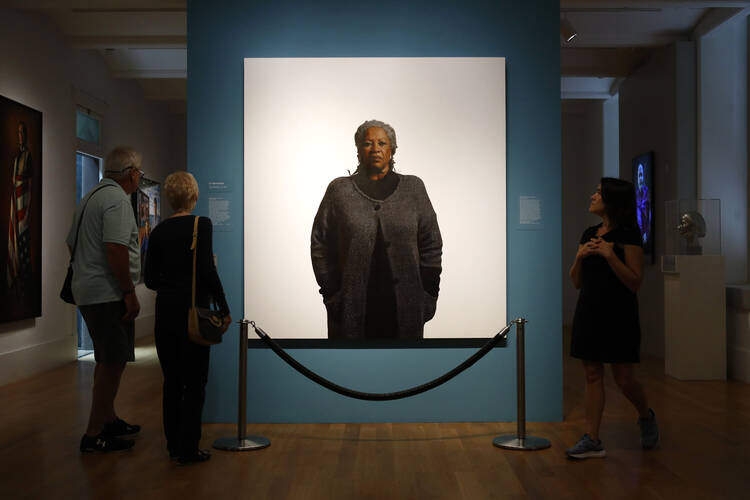Nobel laureate Toni Morrison, a pioneer and reigning giant of modern literature whose imaginative power in Beloved, Song of Solomon and other works transformed American letters by dramatizing the pursuit of freedom within the boundaries of race, died Monday night at the age of 88. America asked its readers how Toni Morrison influenced their life, and how they would remember her. Below are some of their responses.
I was probably too young to read The Bluest Eye when I first picked it up at age 14, but your writing gripped me from that moment on. The canon assigned in traditional education was so largely authored by white writers, reading works outside of that changed the reader and the person who I was and am. You opened my eyes and made me more human, and I am so grateful that your words will forever be in this world even as you have gone to your rest.
Christine Caperson
Philadelphia
As an African-American, I deeply appreciated the depth of her characters. They dealt with some of the pressing life issues that are deeply experienced by me and African-Americans, such as colorism and the long term effects of belonging to a race that was enslaved.
Boreta Singleton
Bronx, N.Y.
Reading Beloved was a watershed moment for me. It made me see racism in a completely new light. Far more than any news article, think piece, statistic or tweet.
Rest in peace, Toni Morrison. Never underestimate the power of fiction.
Ciaran Freeman [former O’Hare Fellow at America]
Washington, D.C.
When I was 16, I came home one afternoon to find a small white book waiting for me on my bed, books being the primary language my mother used to communicate with me. I looked at the cover, pondering the photo of a black girl embracing a white doll, and wondered why my mom had given me what looked to be a book for children. But I sat down and read it anyway, or at least I tried to, the structure confused me so much that I trudged back downstairs to ask my mom why she had given me the book. Because you are ready for it, she replied, go read it again. In retrospect, I wasn’t quite ready for it then, but when I read it again and again, I got closer each time. Words have always been my oxygen, but after reading The Bluest Eye, I realized I had not yet been breathing deeply. Toni Morrison was my gateway to words and worlds beyond my ken. I often think of this when selecting books to share with my teenage students. Like so many, I am deeply saddened that Toni Morrison has passed and am grateful for her gifts to us, her readers. But I also am comforted by the idea that Toni Morrison is now even closer to the spirits she so beautifully conjured. And maybe she is somewhere having a conversation with my mother about what I am ready to read next.
Rachel Nichols
Wynnewood, Pa.
In college, my professor told us we’d read one book, twice, and discuss it all semester: Song of Solomon. We peeled the book like an onion, exploring layer upon layer. I wrote my own footnotes. The copy still sits on my shelf, spine cracked, pages earmarked. It was one of the richest reading experiences I’ve ever had. We were blessed to read and be moved and be challenged by her words.
Amber Kennedy
Chesapeake, Va.
Toni Morrison told the truth and told it so, so beautifully. When I first read The Bluest Eye, I felt like I’d been hit by a thunderbolt of love and grief and indignity. Who else has written so keenly and movingly about hope, evil, endurance, pain, greed, transcendence, all the things that make us human? No one I’ve read. Rest in peace.
Brandon Sanchez [Former O’Hare Fellow at America]
New York, N.Y.
Her poetic imagination and evocation of the unimaginable enlarged my understanding of how fiction can open our eyes and hearts, and helped shape my vision for my first novel in progress.
Brenda Becker
Brooklyn, N.Y.
Reading The Bluest Eye and Beloved as a college student in the late ’80s shocked me into a new reality. It made me realize how little I understood about the context of other people’s stories, and how I can never stop listening, reading and observing if I am sincere about authentic connections with the human race. Forever grateful.
Flo Merkl-Deutsch
Chicago
Toni Morrison: we love you, forever. Your balance of love and power just break me every time, renew me and help make me whole…this too is the gift of your work to the nation and the world. My daughters and I have read The Bluest Eye together when they were young. Their questions were astounding, heartbreaking, beautiful. Your book Home is among the most intimate and unforgettable in world literature: here the unforgivable is forgiven, and thereby we are all lifted from self-embedded life to graceful life in which we can love and give ourselves in service to truth, beauty, goodness, justice and each other.
Shann Ray
Spokane, Wash.
I read Sula as a teenager back in 1984, on the recommendation of Sister Helen Jean at Magnificat High School. I’ve read almost all of her work since then. But Sula got me interested in the effects of systemic white racism and the effects of trauma on child development. Now I am a researcher in child and adolescent psychiatry. All because of Toni Morrison.
Nora McNamara
Fairview Park, Ohio










